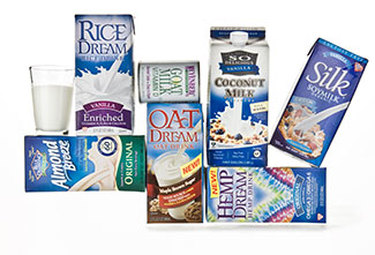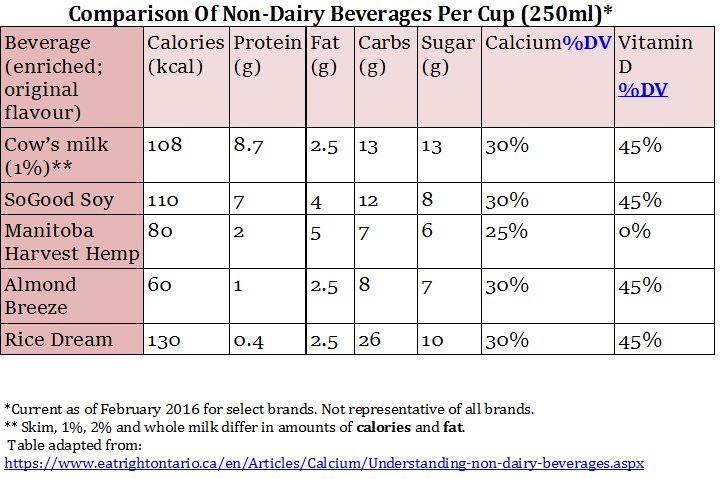|
1. First let’s define plant-based beverages. Plant-based beverages can be made from a variety of grains, nuts, legumes, or other plant sources. These may include soy, almond, coconut, rice, or hemp, among others. 2. Let's say you have decided to try a milk alternative for your child, maybe they have a confirmed milk allergy or suffer from lactose intolerance, or maybe they follow a vegan diet. Whatever the reason is, it’s important to know why Health Canada recommends a specific number of milk and alternative servings for children.  Health Canada recommends the servings shown in the figure above based on specific nutrients that milk and alternatives offer, which support proper growth and development for ages 2-13 years. Milk and alternatives provide protein, fat, calcium, magnesium, phosphorous, vitamins A, D, B12, riboflavin, zinc, and potassium. These nutrients play roles in building and maintaining children’s bones and teeth, building muscle, promoting heart health and many other functions. Fortified soy beverages are included in this food group too. Why is that, you might ask? Soy beverage is the only plant-based beverage that has almost the same nutrients as cow’s milk and therefore is thought to be an equal alternative to cow’s milk. 3. Let’s take a closer look at what exactly it is that cow’s milk, soy beverage, and other plant-based beverages give us: As you can see, soy beverage is the only one that comes close to the protein content of cow’s milk. Protein helps satisfy our hunger, so we feel full after we eat a protein-rich food. It’s important for kids to get enough protein from their food so that they don’t feel too hungry in between scheduled meals and snacks. Another thing to note from the table is that while cow’s milk may seem like it has the highest sugar content (13g/cup) this is all naturally occurring sugar, most of it will be lactose. On the other hand, Almond Breeze has 7 grams of added sugar in the form of cane sugar. By reading the ingredients list on products you can find the hidden sources of sugar in foods. 4. Some parents may consider goat’s milk as another option. Enriched whole goat’s milk offers comparable amounts of protein, calcium, and vitamin D, to cow’s milk. However, enriched whole goat’s milk offers less phosphorous, potassium, and slightly more fat than 3% whole cow’s milk. It is important to know that if you are choosing goat milk as an alternative to cow milk due to cow milk allergy, some people will have allergic reactions to goat milk as well. This is because both kinds of milk have similar types of proteins. 5. Finally, it is very important to choose plant-based beverages that are labeled “fortified” or “enriched”. This ensures that your child is getting enough calcium and Vitamin D from the product to promote optimal bone development for your little one. 6. As the table highlighted, plant-based beverages are mostly all very low in protein (except for soy). Therefore if your child is consuming these beverages instead of cow or soy milk then make sure that they are eating a variety of protein-rich foods (i.e. lentils, beans, tofu, nuts, fish, meat). This will help them to meet their protein requirements to support growth and overall health.  About the Author: Ninfa Garay is a pediatric dietitian working in primary and acute care in Calgary, AB. She holds two degrees from the University of Alberta, in Biology and Nutrition, and completed her Dietetic Internship in Calgary. Ninfa has a passion for helping parents and families navigate the ever-confusing world of nutrition and healthy eating. References
1 Comment
|
|



 RSS Feed
RSS Feed
